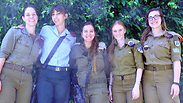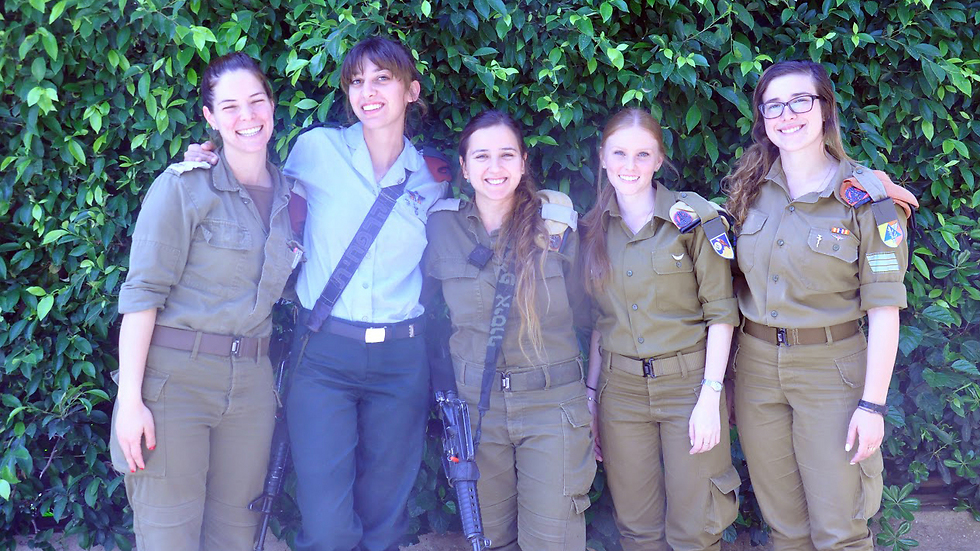
Women warriors: female fighters in the IDF
Five active-duty female soldiers spoke with Ynet about the growing role that women play in the IDF, as well as their experiences and hopes: from reacting to stabbing incidents to how they're treated by male soldiers.
The wave of terror that began last October has highlighted the operational presence of female soldiers serving on the front lines in a fight against terrorism.
These women are not just the soldiers and Border Policewomen who are a direct target from "lone-wolf" terrorists, but also are those who form an integral part of IDF operations in Jerusalem, the West Bank and the tense border with Gaza.

Female soldiers take part in arrest raids at the heart of the West Bank, are the first to rush to the scene of a stabbing incident, strengthen the security presence in dangerous areas, stand strong against angry mobs, and serve as the eyes of the IDF on the Gaza border, keeping watch and making sure that Hamas operatives don't sneak into Israel.
Five female combat soldiers came together to discuss the key roles they play in battle, and the complex realities they face in Gaza and the West Bank.
Ynet spoke to Cpt. Paz Rokach, 24, a medical officer in the Binyamin Division, which operates in and around Ramallah; Lt. Shahaf Shwartz, 23, who served as an operations officer for the Golani Brigade during Operation Protective Edge; Sgt. Yael Sandler, 21, a lone soldier from California who assisted in rescuing two Oketz soldiers who accidentally entered the Qalandia Refugee Camp two months ago; Lt. Ofir Asulin, a Field Intelligence officer who was injured in a stabbing incident at a gas station on route 443; and Cpl. Linoy Ben Yitzhak, who identified three terrorists planting three IEDs on the northern border of Gaza.
What does it mean to be a female combat solider in 2016? Are there still noticeable differences, or can we declare the integration of women into the army to be a success?
“There are certain things that men are better at,” said Cpt. Rokach. “That said, when a woman really wants something, she can accomplish anything.”
Lt. Schwartz added, “Physically, I feel I can perform any task, and that the experience I gained makes it all possible. I've had to carry heavy objects, and I did it well.”
Sgt. Sandler confirmed that like other female soldiers, “I do everything that the men do. It's all in the mind. As female combat soldiers, we march for miles when going on arrest raids, including those dealing with back pains. We're strong. I would have tried to join the Givati or Golani Brigades if I could have.”
“Sometimes the women are stronger than the men,” she shared, while stressing that “our job isn't for every woman. But if you want to give three years of your life, with all the sudden call ups and being on base for 11 out of every 14 days, you can do anything.”
Sandler also spoke about her experiences going into the refugee camp Qalandia during a riot, to rescue two soldiers who had lost their way.
“We were reinforcing a patrol in the Ramallah area, and all of a sudden we heard that there may have been two soldiers kidnapped in Qalandia, and that the Hannibal Directive would soon be put into effect. We didn’t have much time. We entered the camp, heard shooting and had Molotov cocktails thrown at us while hundreds of people were watching us from the rooftops, just like in the movies. We saw the missing soldiers' army vehicle completely burned, but we still got out of our vehicle to conduct a search for the soldiers. That's when I got shrapnel in my eye.”
She continued, “We were yelling for the soldiers, shouting 'We're here, we're here' in Hebrew. Terrorists and attackers could have come from anywhere. We eventually found them hiding underneath a staircase in the camp.”
I have no room to develop
The IDF likes to boast that 90 percent of the positions available are now open to women, causing a significant rise in the number of women who request to serve alongside men as combat soldiers in field units that have recently opened up.
Nevertheless, the core of the IDF is still male-dominated, specifically elite technology units, mixed infantry units and within the ranks of the highest-ranking officers.
From time to time, a female soldier will achieve an historical breakthrough, such as the first female battalion commander in field intelligence and the IDF Officers' Training School, a female commander of a missile boat, and soon, the first female battalion commander in the Artillery Corps.
The ground forces have been carrying out tests to determine how to integrate women into combat roles within the Armed Corps, but the initiative failed due to physiological reasons.
For now, the submarine fleet will also remain exclusively male, due to the close proximity between crewmen serving in submarines, though it is possible to find women in both the tank and submarine crews in armies around the world.
For the time being, in infantry units such as Golani, the Paratroopers', and IDF Special Forces units, women will remain in the auxiliary positions only.
It seems that the main obstacle surrounding the integration of female officers into the military concerns those aged 25-30, who are preparing to start a family. “I’m going to be at a personal intersection in about two years, when I’ll have to decide whether to continue with my service or not,” said Lt. Rokach. “My own mother had a military career when I was a child, and as a result she missed many events. On the one hand you believe in what you’re doing, but on the other you pay a very high price for it. This is true for men, as well, and I certainly don’t think that a woman’s place is at home, but I personally wouldn’t want to raise my children while I spend every third weekend on base.”
Lt. Ofir's driver, Ziv Mizrahi, was killed during a stabbing attack when Ofir was injured. “I went out for a patrol to show Ziv the area,” she said. “We stopped at a gas station on Route 443. That's when the terrorist ran toward us with a knife, stabbing me and Ziv. Another officer who was standing nearby shot him within five seconds, saving my life, but Ziv was killed. The incident caused me to suffer from anxiety, so after a recovery period I returned to serve as an officer at a combat training base. I hope to come full-circle by returning to the area.”
When asked about the difficulties related to combining a military career with starting a family, she said, “That’s one of the reasons why they stopped sending female officers to tactical command college (where they take part in a prestigious course for promising young officers —YZ).” And yet, she stressed “I went back after my injuries because I love what I do, and I want to keep doing it past the age of 25.”
“I’m a 24-year-old headquarters officer,” said Cpt. Rokach. “Everyone else there is above 30.” She explained that facing an at-times belittling attitude serves to motivate her further. “You want to prove yourself, because you believe in yourself. When you go hom,e you're still alert, keeping your phone to your ear.”
Lt. Schwartz, who serves as a sniper instructor, is due to be released in the summer after being recognized for exemplary service as a Golani Operations Officer during Operation Protective Edge. During one of her division’s first and toughest battles, the unit’s top brass was hit, and for a few long minutes (and after functioning for several days without sleeping), she found herself commanding the complex event from headquarters.
“I’m due to be released in August for two very clear reasons," she said. "The first is that I’m getting married, and the second is because unfortunately, I come from a corps where I don’t have a lot of options in terms of promotion. I’m not about to be anyone’s assistant. I’m not going to move to an operations position at the Adam facility (a rear base —YZ).” For her, “serving as a company commander would be a dream position. After doing that, I could finish my army service.”
‘People stare at us’
Cpl. Linoy Ben Itzhak mentioned dealing with offensive comments from male soldiers. She had been on look-out when she spotted a group of terrorists attempting to lay three explosive devices near the northern border of the Gaza Strip. It was considered the most substantial attempt to harm IDF soldiers post-Protective Edge, and one which an Intelligence tip along with Linoy successfully identifying the terrorist unit had successfully managed to thwart without any injuries among the soldiers, along with one terrorist killed and two others neutralized.
“I was beginning a shift like any other at the Gaza Division Observation Headquarters,” she said. “I began scanning the northern shoreline when I recognized three suspect individuals hiding among the dunes and pointing at our soldiers. I contacted our unit to direct them to the terrorists while at the same time giving their coordinates to the Air Force, which ultimately managed to bomb them.”
Despite playing a role in various military successes, the prejudice against them has yet to vanish. “People think we sit in front of a screen 24/7,” she said. “They have no idea that we scan, speak to the grounds forces and do so much more. They just assume we’re slamming burgers and fries in front of our screens and that that’s why we’re fat and blind and need glasses. We still hear this kind of stuff from combat soldiers when they first arrive.”
“Sometimes they stare at us like visitors at a zoo looking at animals held in cages. We get 30 soldiers standing in front of us saying, ‘Go on, show us an Arab.’ And then, five months later, before they finishing their service in our area, they come back to say ‘Thank you. We couldn’t have done it without you. You’ve got the hardest job in the army.’”
Will the next one die, as well?
Lt. Rokach found herself commanding over the treatment and evacuation of people of close to 200 injured people in 2015 alone, including soldiers, civilians and terrorists who had been neutralized. Along with the rest of her team, she treated the Givati soldiers injured during a shooting incident at the Focus Blockade at the entrance of Rammallah.
Last February, she was the first to arrive at the terror attack at a Rami Levi supermarket in Sha’ar Binyamin. In addition to one casualty and one injured civilian, Rokach also found herself in a precarious situation, when she was given clearance to approach the fatally wounded terrorists, after making certain that they were not carrying explosives on their person.
“They were helpless,” she said. “We treated and evacuated them as quickly as we could. The kind of response this incurred and the amount of curse words aimed at my mother were just crazy. But those are the values we were raised on. It brings up mixed emotions when you hear people around you saying ‘kill him.’ There were incidents along the Gaza Strip where soldiers shot and disarmed a terrorist and then carried him on a gurney for three kilometers.”
“An injured terrorist is still a human being,” says Rokach. “You do feel an apprehension when you approach and treat a terrorist, but as a commander you have to take the first step forward.”
When asked about the hardest moments during her service, Rokach recalls an incident where a bus flipped over near the town of Kokhav Ya’ir. “I commanded over the rescue and evacuation of 40 injured people. The worst cases were the ones where I couldn’t save someone, for instance during the Danny Gonen and Malachi Rosenfeld incidences. It frustrates you, and makes you ask, ‘Will the next one die, as well?’”










